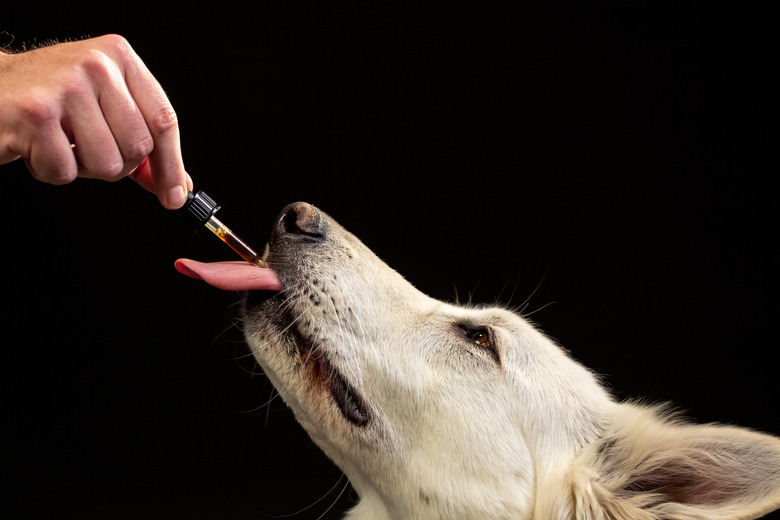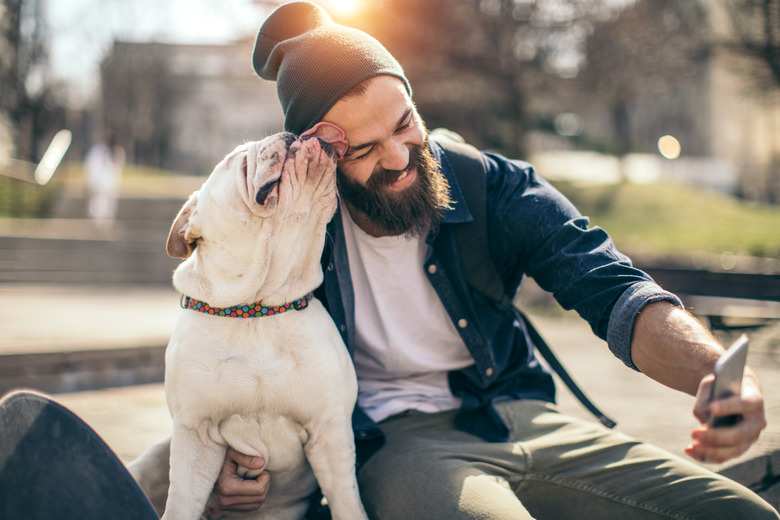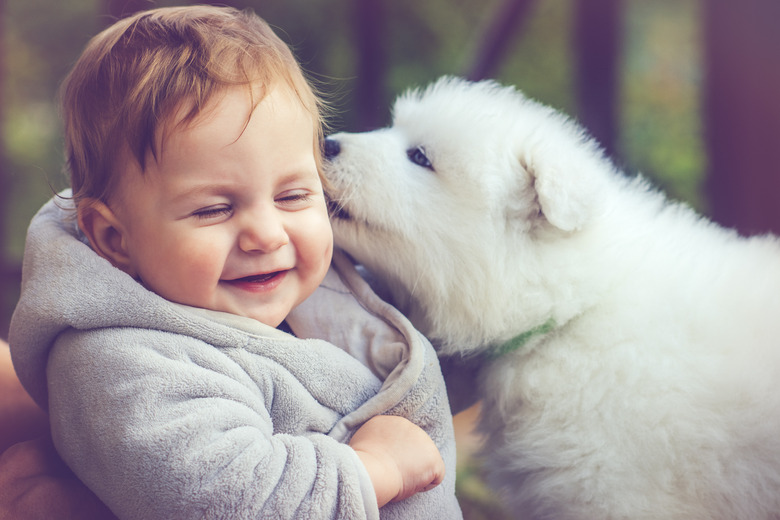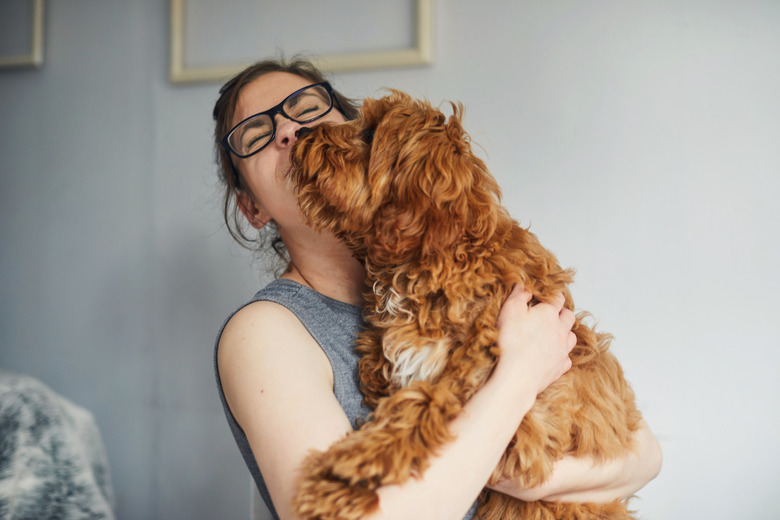Why Do Some Dogs Love Licking People, While Others Don't?
Every dog is wonderful and perfect in its own special way, but every dog is also a unique being with a distinct personality and set of preferences—just like humans. So why do some dogs lick so much and put their tongues on the face of any human who gets within licking distance, while others turn their noses up (literally) even as you beg for some slobbery affection? The reason why some dogs love kisses and others seem to almost hate them boils down to communication style, pack hierarchy, whether licking was encouraged or discouraged by their owners, and, perhaps, even the way you taste.
Why dogs love licking
Why dogs love licking
Let's start with the basics: why do dogs lick to begin with? A dog's relationship with licking begins right away, basically the moment he's born. From its first moments on earth, a dog experiences its mother licking it to stimulate them to start breathing, clean and groom them, and communicate. Licking is literally vital to a newborn puppy's survival, so the behavior has deep roots for them.
Even later in life, licking serves a lot of purposes for dogs. It's a way they can communicate — both with each other and with their people — and gather information, similar to the role of sniffing.
Dogs licking each other
Dogs licking each other
According to Stilwell, licking is, like so many things, a behavior that's linked to pack hierarchy.
"It's also sort of a submissive gesture — the more subordinate members of a pack will lick the more dominant members and that's important in maintaining pack harmony," she writes.
Licking is also a way that dogs can increase the bond between themselves and other members of the pack and a way to welcome other dogs back into the pack after an absence.
Why dogs lick humans
Why dogs lick humans
Dogs lick humans for a variety of reasons. For one, human skin has a naturally salty taste, which dogs tend to love.
"It seems gross to us, but our sweaty, salty skin can be intriguing to dogs, who tend to explore the world with their mouths and are comforted by the scent of their caring owners," the experts at the AKC say. "It's the same reason they often steal our socks and underwear."
Licking can also just be a matter of habit—they've been licking the things they live with since they were puppies, so they keep licking the things they live with, which are now humans.
In some cases, it's even a learned behavior—as in, a dog kiss-loving owner has trained the pup to shower humans with kisses. Mostly, with domestic dogs, it's a sign of affection. The meaning of a dog lick depends on the circumstances and your dog's body language. Long, slurpy kisses that are accompanied by a soft, wiggly body are usually very affectionate gestures. Other "kisses" might be a shy dog trying to put a little space between the two of you.
Why some dogs LOVE kisses
Why some dogs LOVE kisses
If your dog has learned that kisses = attention and a happy human, then he is probably going to keep showing his love in the most slobbery of ways possible. The truth is, you're always training your dog, whether you realize it or not. A lot of what dogs do, they do to get our attention and any behavior that earns them that coveted attention is one they'll rely on more and more. So, whether kisses make you stop looking at your phone and giggle with joy or make you stop looking at your phone to yell "Stop!" your dog has learned that putting his tongue on your face gets you to look away from the evil rectangle in your hand and look at his adorable mug instead.
Why the driving need for attention? It's because dogs are descendants of wolves, which means they inherited their ancestors' pack mentality. But, not only are dogs just naturally inclined to be social animals, we've actually bred them to be even more social than wolves. This means that social interaction and companionship are incredibly high on a dog's list of life priorities and most will do just about anything to satisfy that need—including obsessive French kissing.
Attention-seeking isn't the only driving force behind obsessive kissing, though. Licking promotes the release of endorphins, which floods your dog with feelings of pleasure and comfort. Studies have shown that dogs who are frequently kissed by their owners have higher levels of oxytocin (the "love" hormone) than other dogs, even if those dogs also get lots of attention from their owners.
Finally, you can look at how dogs use licking to communicate with each other to help explain your pup's obsession with kissing you. In packs, dogs lick to groom each other—but only with dogs with whom they share a really solid bond. Licking is also usually a sign of submission and respect. So, kisses could be your dog's way of saying, "We are super close and I respect and love you so much," which is actually just the sweetest.
Obsessed with mouth kissing
Obsessed with mouth kissing
There's a subset of kissing-obsessed dogs who have a strong oral fixation—as in they are fixated on getting their tongue into your oral cavity. If your dog is obsessed with licking your lips raw with kisses, the behavior could trace back to his earliest puppy days.
Both wild and domestic dogs lick around their mother's mouth as newborns to stimulate her to regurgitate food for them. Many puppies retain that instinct and some older dogs are more than willing to go after that steak taste on your face or are attracted to your food-laden breath.
Why doesn't my dog lick me?
Why doesn't my dog lick me?
Although dogs will lick to show affection, kissing isn't an innate behavior for dogs. Dogs don't naturally have the same concept of kissing as humans do.
Some dogs, particularly dogs who weren't socialized to humans, were trained not to lick, or suffered traumas early in life, don't develop positive associations with kissing. They might even react with fear and growling if a human leans in to give them a smooch. It's not a sign that they hate the human in question, but, for a dog who isn't accustomed to kisses, the basic behavior (another, probably bigger thing coming at it mouth-first) may feel like a threat.
And, just like humans, whether or not your dog kisses you comes down to preference. Not all dogs enjoy kissing—and they'll let you know if they're in that camp, usually by reacting with aggression or apprehension.
References
- American Kennel Club: Why Is My Dog Licking Me?
- The Laborador Site: Do Dogs Like Kisses?
- Wag Walking: Why Dogs Don't Like Kisses
- Animal Wised: Do Dogs Like Kisses?
- Taylor-Francis Online: Associations between the Psychological Characteristics of the Human–Dog Relationship and Oxytocin and Cortisol Levels
- The Dodo: How To Tell What Your Dog's Kisses Really Mean




